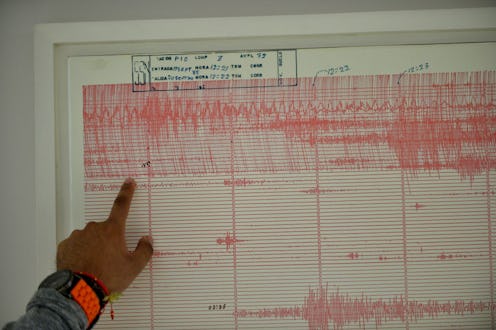News
This Will Put The Strength Of A Magnitude 8 Earthquake Into Perspective

All eyes may be focused on the hurricanes currently making their way across the Atlantic, but the earth is here to remind you that there are other types of natural disasters. A magnitude 8 earthquake was just registered off the southern coast of Mexico — and in case you're wondering how strong a magnitude 8 earthquake is, well, you're definitely going to wish that you didn't have to be asking that question.
The scale used to measure earthquake strength is the Richter scale, and it's logarithmic, which means that each notch on the scale is 10 times more powerful than the one before it. The scale starts at one and goes all the way up to 10, with magnitude 1 earthquakes happening imperceptibly literally all the time, and magnitude 10 earthquakes happening extremely rarely — only about once every 1,000 years. The strongest earthquake ever recorded was a 9.5 that hit Chile in 1960.
The fact that 9.5 is the is the strongest quake ever recorded tells you something about the earthquake that just hit off the coast of Mexico. While a magnitude 9 earthquake is still 10 times bigger than an earthquake of magnitude 8, a magnitude 8 can still do some serious damage.
Depending on where the earthquake's epicenter is, a magnitude 8 earthquake can cause anything from slight damage to poorly built structures to bent railroads and destroyed bridges. This particular earthquake struck 76 miles away from the nearest town, Pijijiapan, but it was felt as far away as Mexico City. It also occurred under the ocean, which means that a tsunami could follow in its wake. Tsunamis can also be very dangerous for people on the coast, as huge quakes can create significant disturbances in the water. This quake in particular has the potential to cause tsunami waves everywhere from Central America to the Pacific islands to Antarctica, although the biggest ones, which could reach up to 10 feet above normal wave height, are predicted in Mexico.
In general, magnitude 8 earthquakes occur about once a year, and they cause very severe movement. Magnitude 3 quakes are about the lowest on the scale that people really register, and even those can be quite frightening for people in the upper floors of shaking buildings. Magnitude 8 earthquakes, then, are about 100,000 times stronger than that — so it's no surprise that people in Mexico City, about 500 miles away from the epicenter, could feel it so strongly. Aftershocks are likely to continue for the next several days and even weeks, so Mexico might not be out of the woods yet. Authorities are currently assessing the damage, because a magnitude 8 earthquake will certainly have left plenty of it.